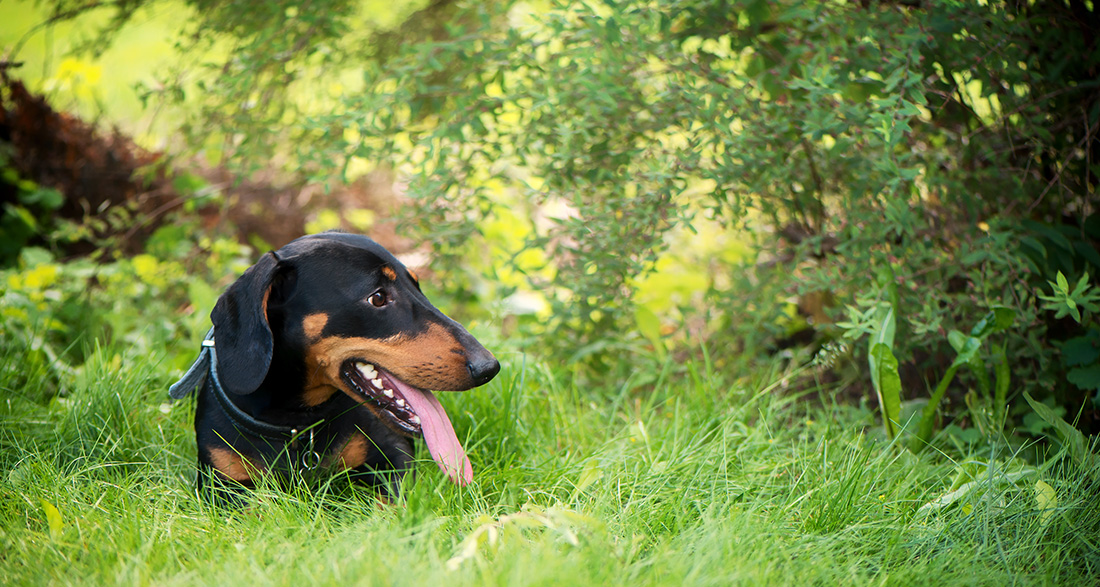Every now and then, does your furry friend nibble on juicy green blades in the garden or during a walk? Generally, no cause for concern! But where do these grass cravings come from?
Is it normal for my dog to eat grass?
Clearly, eating grass is in a dog’s nature. Even its ancestors, the wolf and the wild dog, liked to supplement their diet with a few fresh green stems. Puppies learn to eat grass in their earliest childhood, observing it from their mother.
Eating grass is not only a natural thing for dogs; it can also have demonstrably positive effects on their health and well-being. So, go ahead and let your four-legged friend enjoy his occasional dose of green!
Which grass is allowed?
While indulging is fine, what matters is the quality of the grass your dog is allowed to eat. It should be clean and free from harmful environmental toxins such as exhaust fumes, pesticides, and the like. Avoid grassy areas near busy roads or freshly fertilized or sprayed field edges. Hands, sorry, paws off from too thick, sharp blades! These can cause problems in the gastrointestinal tract.
You might be wondering what exactly is meant by grass? Behind the banal term are actually various (wild) herbs that grow along the wayside and catch your four-legged friend’s attention. Some not only taste excellent to your furry friend but also contain beneficial ingredients.
For example, dandelion is said to have diuretic, detoxifying, and blood-cleansing effects. Plantain, among other properties, is said to have an antibacterial effect and protect the bronchi.
7 Reasons Why Dogs Eat Grass
Why do many of our four-legged friends find green so irresistible? To date, there is no scientific explanation, but there are some speculations. Here are some explanations for you.
1. Grass tastes delicious:
“Woof,” thinks many dogs, “this tastes good!” Fresh young grass contains not only bitter substances but also sugary components – and they obviously appeal to the taste of many furry noses.
2. Nutrient deficiency is present:
For the “omnivorous” dog, not only meat but also plant-based foods like fruits, vegetables, and indeed grass are a welcome addition to the menu.
A vegetarian diet helps cover your four-legged friend’s nutrient needs. If he is deficient, this can be a compelling reason why he frequently nibbles on the lawn. Like other plants growing in the great outdoors, grass contains valuable fiber, vitamins, and minerals. If you’re concerned that your beloved pet is not getting enough of these nutrients, it’s best to consult a veterinarian.
3. Digestive Issues in Dogs:
Bone fragments, swallowed hair, or foreign objects: Some things can literally weigh heavily on your dog’s stomach. Eating grass promises relief in such cases.
The chewed, fine blades tickle the dog’s throat and help induce a gag reflex. This way, your sweetheart can naturally get rid of the discomfort.
Of course, your little one can also pass the foreign object through feces. The grass serves as a means of transportation. It wraps the culprit and thus protects the stomach and intestinal walls in the digestive tract.
4. Your dog is thirsty!
Grass contains a lot of liquid. If your furry friend is acutely thirsty and no water source is in sight, he occasionally opts for the green thirst quencher.
5. Stress relief!
Excitement and stress can also be a reason for eating grass. Stress lowers blood sugar levels. To raise them back to normal, the sugary substances in fresh grass come in handy.
6. So boring!
Sometimes, the mystery behind eating grass is simply boredom. Naturally, dogs love action, fun, play, and exercise. If they don’t get enough of it, they eventually look for alternative activities. They enjoy spending their time pulling and chewing on grass blades.
How to prevent your furry friend from eating grass out of boredom? Well, it’s quite simple: Keep him active! Take longer walks, play, and have fun with him as often as possible. This not only keeps your animal companion away from the greenery but also contributes to his (and your own) fitness!
7. Expression of fear:
Many dogs don’t like being separated from their owners. They feel lonely and uncomfortable when they have to spend a long time alone at home. Sometimes, they even suffer from real anxiety! Eating grass can be the animal’s attempt to combat negative feelings and cope with panic in such cases.
The easiest solution: Spend more time with your four-legged friend! A little trick: Leave your personal scent mark. For example, your dog loves to snuggle up to the blanket that smells like you. This way, your fine sense of smell always has a part of you with him, even when you’re not around! It calms down and can help reduce the appetite for grass.
When to be concerned?
Eating a bit of grass occasionally is completely fine for dogs. However, if your beloved one suddenly chews on green plant stems noticeably often, excessively, or compulsively, your alarm bells should ring.
Especially when symptoms like vomiting, diarrhea, or loss of appetite occur, you should quickly consult your veterinarian. Also, if there are signs such as weight loss, blood in the stool, fatigue, licking the lips, or other noticeable changes, a veterinary professional is the first point of contact.
Do you have questions about this or any other animal-related topic? Feel free to leave us a comment.


